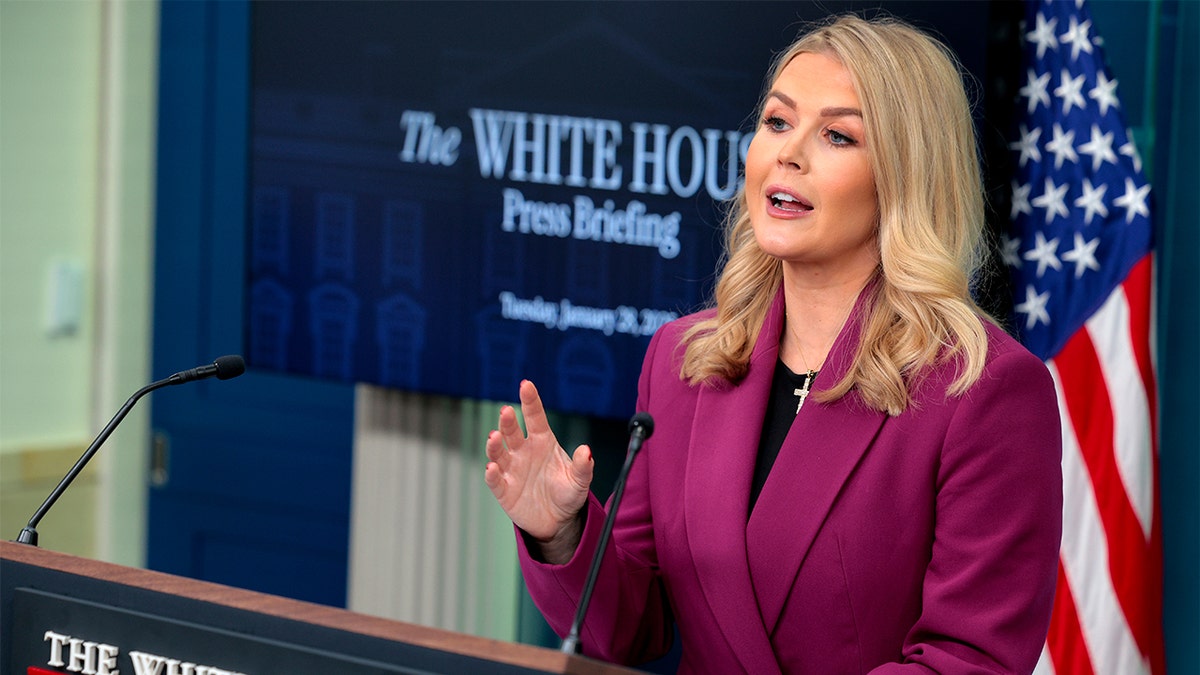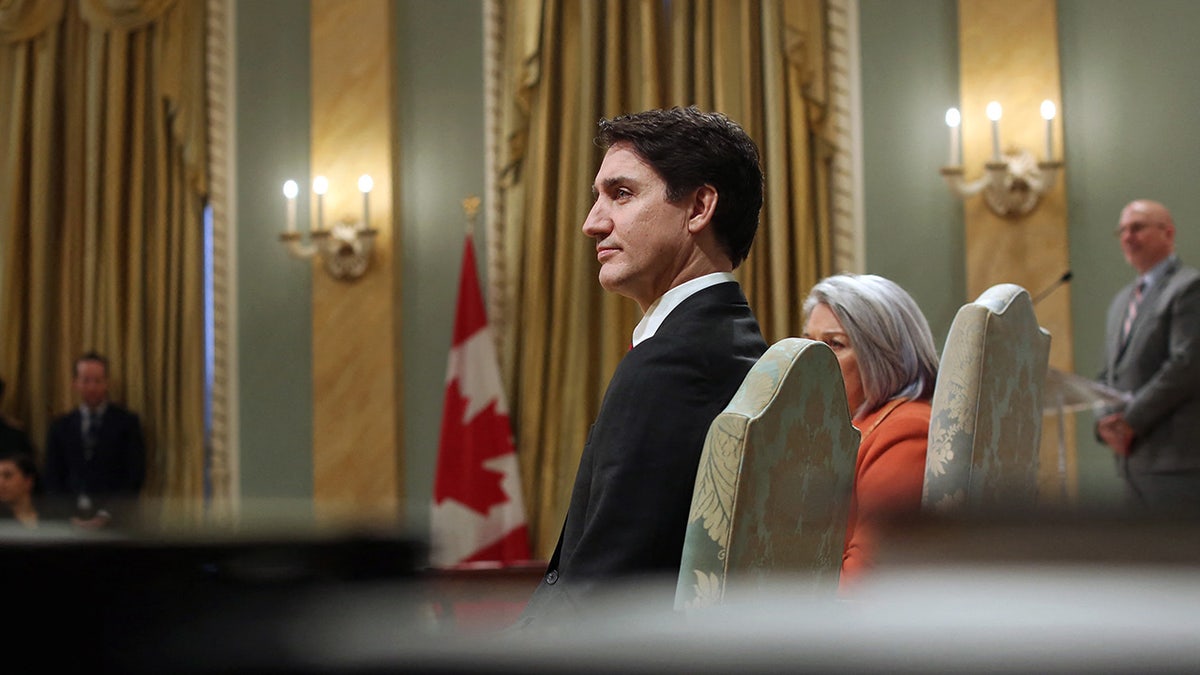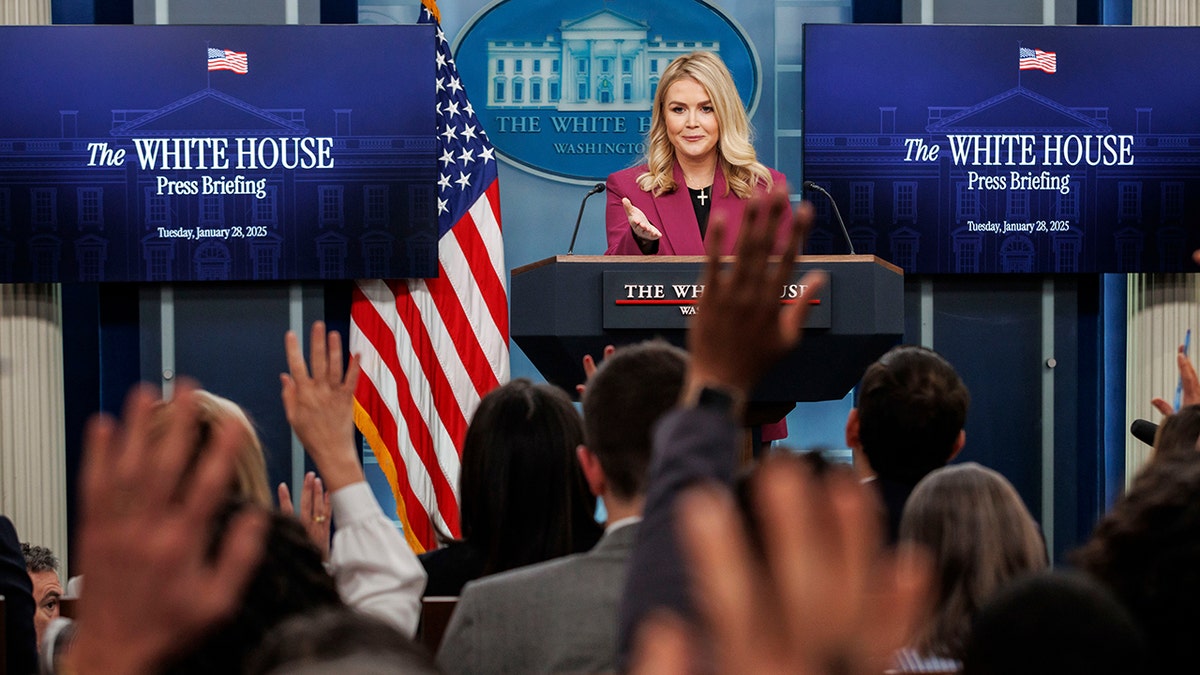President Donald Trump isn’t worried about American consumers taking a hit after unveiling new tariffs on Mexico, Canada and China, and said the tariffs will ensure that other countries treat the U.S. “fairly.”
“There may be temporary, short-term disruption, and people will understand that,” Trump told reporters Friday in the Oval Office.
Trump also signaled that he also may increase tariffs for European Union countries, and said that the tariffs would make the U.S. “very rich and very strong.”
White House press secretary Karoline Leavitt announced earlier Friday that Trump would roll out tariffs on Mexico, Canada and China starting Saturday.
Trump’s economic plan during his campaign called for extending the 2017 tax cuts and imposing tariffs ranging from 10% to 20% on all imported goods. For countries like China, that number could go up to 60%.
TRUMP TREASURY PICK: EXTENDING TRUMP TAX CUTS ‘SINGLE MOST IMPORTANT ECONOMIC ISSUE’

White House press secretary Karoline Leavitt holds her first news conference at the White House in Washington, D.C., on Tuesday. (Chip Somodevilla/Getty Images)
These countries will face these tariffs because they have allowed an “unprecedented invasion of illegal fentanyl that is killing American citizens,” according to Leavitt.
“The president will be implementing tomorrow a 25% tariff on Mexico, 25% tariffs on Canada, and a 10% tariff on China for the illegal fentanyl they have sourced and allowed to distribute into our country, which has killed tens of millions of Americans,” Leavitt told reporters on Friday at a White House press briefing. “These are promises made and promises kept.”
CANADA READIES TRUMP TARIFFS RESPONSE: ‘IN A TRADE WAR, THERE ARE NO WINNERS’

Canadian Prime Minister Justin Trudeau said Friday that Canada was prepared to respond to any U.S. tariffs. (Dave Chan/AFP via Getty Images)
CLICK HERE TO GET THE FOX NEWS APP
Canadian Prime Minister Justin Trudeau said Friday that Canada was prepared to respond to any tariffs executed, and warned there could be “disastrous consequences” for American workers and consumers.
“We’re ready with a response, a purposeful, forceful but reasonable, immediate response,” Trudeau said. “It’s not what we want, but if he moves forward, we will also act.”
Meanwhile, Leavitt said that the tariffs are not expected to spark a trade war with Canada and that Trump would respond to Trudeau in “due time.”
“The president is intent on doing this,” Leavitt said. “And I think Justin Trudeau would be wise to talk to President Trump directly before pushing outlandish comments like that to the media.”
When asked if Mexico, Canada or China could offer any concessions to remove these new tariffs, Leavitt said Trump would decide at a later date.
“If the president at any time decides to roll back those tariffs, I’ll leave it to him to make that decision,” Leavitt said. “The president is intent on ensuring that he effectively implements tariffs while cutting inflation costs for the American people.”
Leavitt also said that Trump hadn’t determined a timeline for additional tariffs on European Union countries, and said she wouldn’t “get ahead” of Trump on that matter.
But Senate Minority Leader Chuck Schumer, D-N.Y., said he’s concerned that the tariffs will only mean cost increases for American consumers.
“We should be focused on going hard against competitors who rig the game, like China, rather than attacking our allies,” Schumer said in a statement Friday. “If these tariffs go into full effect, they will raise prices for everything from groceries, to cars, to gas, making it even harder for middle-class families to just get by.”
HOUSE DEMS THREATEN TO BLOCK TRUMP’S BIG TARIFF PLANS: ‘UNACCEPTABLE’

White House press secretary Karoline Leavitt confirmed that President Donald Trump will execute tariffs on Mexico, Canada and China starting Saturday. (Samuel Corum/Politico/Bloomberg via Getty Images)
House Republicans moved to reintroduce the U.S. Reciprocal Trade Act on Jan. 24, a measure that would permit Trump to unilaterally impose trade taxes on both adversaries and allies.
Trump previously praised the measure in 2019, claiming it would “give our workers a fair and level playing field against other countries.”
Meanwhile, Democratic Reps. Suzan DelBene, D-Wash., and Don Beyer, D-Va., also introduced their own legislation in January that would block Trump from using emergency powers to implement tariffs, amid concerns that American consumers would end up footing the bill.
“The American people have clearly and consistently said that the high cost of living is one of their top concerns,” DelBene said in a statement on Jan. 15. “Not only would widespread tariffs drive up costs at home and likely send our economy into recession, but they would likely lead to significant retaliation, hurting American workers, farmers, and businesses.”
The Associated Press and Fox News’ Elizabeth Elkind contributed to this report.